- Online car hire since 2005
Car hire Spain
Save time and money. We compare the offers of car rental companies in Spain on your behalf.
- Free cancellation Up to 48 hours prior to the scheduled pick up time
- Best price guarantee Have you found a better price? Let us know and we will make you a better offer.
- 24000+ pick-up locations Locations around the world
Car hire Spain
EasyTerra Car Hire Spain is an independent car hire comparison site. Our system compares prices from well-known car hire companies so as a customer you can always book your hire car through us at a competitive rate.
Car rental offers in Spain
Whether you're looking for a small rental car or a station wagon for the entire family, we will always have a suitable vehicle for the lowest price. Below are some examples from our selection in Spain.

-
DelPaso From£ 4 /day -
Record Go From£ 5 /day -
Centauro From£ 6 /day

-
DelPaso From£ 4 /day -
wheego From£ 4 /day -
OK Mobility From£ 5 /day

-
Goldcar From£ 7 /day -
Centauro From£ 8 /day -
KeyGo Rent From£ 8 /day

-
wheego From£ 4 /day -
Record Go From£ 5 /day -
OK Mobility From£ 5 /day

-
Orlando Rent a Car From£ 5 /day

-
Goldcar From£ 7 /day

-
Orlando Rent a Car From£ 5 /day -
Thrifty From£ 9 /day -
Dollar Rent a Car From£ 10 /day

-
OK Mobility From£ 5 /day -
Goldcar From£ 6 /day -
Autos Menorca From£ 10 /day

-
Clickrent From£ 8 /day -
Gobycar From£ 8 /day -
TopCar From£ 11 /day

-
wheego From£ 3 /day -
Gobycar From£ 8 /day -
Record Go From£ 9 /day

-
wheego From£ 4 /day -
Orlando Rent a Car From£ 6 /day -
Goldcar From£ 6 /day

-
Goldcar From£ 7 /day -
Centauro From£ 8 /day -
Orlando Rent a Car From£ 10 /day

-
DelPaso From£ 4 /day -
OK Mobility From£ 6 /day -
Nizacars From£ 8 /day

-
wheego From£ 5 /day -
Turisprime From£ 7 /day -
Record Go From£ 8 /day

-
Orlando Rent a Car From£ 9 /day -
Thrifty From£ 10 /day -
TopCar From£ 12 /day

-
Orlando Rent a Car From£ 6 /day -
TopCar From£ 9 /day -
Rentbycar From£ 10 /day

-
Orlando Rent a Car From£ 6 /day -
Goldcar From£ 6 /day -
OK Mobility From£ 6 /day

-
Gobycar From£ 9 /day -
TopCar From£ 13 /day -
wheego From£ 13 /day

-
wheego From£ 5 /day -
Orlando Rent a Car From£ 8 /day -
Goldcar From£ 8 /day

-
wheego From£ 6 /day

-
Centauro From£ 8 /day

-
wheego From£ 6 /day -
OK Mobility From£ 9 /day -
Autos Menorca From£ 10 /day

-
wheego From£ 6 /day

-
Orlando Rent a Car From£ 11 /day -
TopCar From£ 12 /day -
Thrifty From£ 13 /day

-
DelPaso From£ 6 /day -
Orlando Rent a Car From£ 7 /day -
Goldcar From£ 10 /day

-
Record Go From£ 7 /day -
Autos Menorca From£ 10 /day -
Ownerscar From£ 11 /day

-
Turisprime From£ 11 /day -
Avis From£ 14 /day -
Budget From£ 14 /day

-
Goldcar From£ 9 /day -
Goldcar Key'n Go From£ 26 /day -
Thrifty From£ 31 /day

-
Goldcar From£ 9 /day

-
Goldcar From£ 12 /day -
TopCar From£ 15 /day -
Nizacars From£ 15 /day

-
Goldcar From£ 9 /day -
Autos Menorca From£ 12 /day -
TopCar From£ 12 /day

-
Goldcar From£ 9 /day -
wheego From£ 10 /day -
Centauro From£ 13 /day

-
Goldcar From£ 12 /day -
Centauro From£ 18 /day -
Thrifty From£ 21 /day

-
Goldcar From£ 9 /day -
Gobycar From£ 19 /day -
Thrifty From£ 20 /day

-
Goldcar From£ 9 /day -
OK Mobility From£ 10 /day -
Wiber Rent a Car From£ 12 /day

-
TopCar From£ 12 /day

-
OK Mobility From£ 12 /day

-
OK Mobility From£ 12 /day -
Budget From£ 25 /day

-
OK Mobility From£ 19 /day

-
wheego From£ 18 /day -
Alamo From£ 28 /day -
Europcar From£ 30 /day

-
K10 Rentacar From£ 18 /day -
Autos Menorca From£ 32 /day

-
TopCar From£ 19 /day

-
Goldcar From£ 19 /day -
Alamo From£ 28 /day -
Enterprise From£ 31 /day

-
Goldcar From£ 19 /day -
Alamo From£ 28 /day -
Dollar Rent a Car From£ 28 /day

-
TopCar From£ 19 /day

-
TopCar From£ 22 /day

-
TopCar From£ 22 /day

-
OK Mobility From£ 23 /day

-
OK Mobility From£ 23 /day -
Alamo From£ 47 /day -
Enterprise From£ 50 /day

-
Budget From£ 24 /day -
Avis From£ 27 /day -
TopCar From£ 31 /day

-
OK Mobility From£ 23 /day

-
OK Mobility From£ 23 /day -
Hertz From£ 31 /day -
Dollar Rent a Car From£ 41 /day

-
Budget From£ 24 /day -
Avis From£ 27 /day -
Sixt From£ 42 /day

-
OK Mobility From£ 23 /day -
KeyGo Rent From£ 32 /day -
Drivalia From£ 35 /day

-
Record Go From£ 21 /day -
Drivalia From£ 25 /day -
Europcar From£ 56 /day

-
Record Go From£ 21 /day

-
TopCar From£ 24 /day

-
Record Go From£ 22 /day

-
TopCar From£ 24 /day

-
Drivalia From£ 27 /day -
Record Go From£ 40 /day -
Europcar From£ 65 /day

-
TopCar From£ 24 /day -
Canarias Rent a car From£ 50 /day

-
TopCar From£ 27 /day

-
TopCar From£ 24 /day

-
Goldcar From£ 8 /day -
Wiber Rent a Car From£ 12 /day -
Thrifty From£ 13 /day

-
Record Go From£ 9 /day

-
Record Go From£ 14 /day

-
Record Go From£ 9 /day

-
OK Mobility From£ 9 /day -
wheego From£ 17 /day

-
Nizacars From£ 15 /day

-
Record Go From£ 9 /day

-
Record Go From£ 10 /day -
wheego From£ 16 /day

-
Record Go From£ 17 /day

-
Hertz From£ 18 /day -
Record Go From£ 36 /day -
Clickrent From£ 46 /day

-
Goldcar From£ 22 /day

-
Budget From£ 26 /day -
Avis From£ 27 /day -
Dollar Rent a Car From£ 59 /day

-
Budget From£ 24 /day -
Avis From£ 27 /day -
Dollar Rent a Car From£ 55 /day

-
Budget From£ 25 /day -
Avis From£ 27 /day -
Sixt From£ 109 /day

-
Avis From£ 28 /day -
Budget From£ 29 /day

-
Hertz From£ 27 /day

-
Hertz From£ 39 /day -
Dollar Rent a Car From£ 40 /day -
Drivalia From£ 58 /day

-
TopCar From£ 34 /day

-
Goldcar From£ 7 /day -
OK Mobility From£ 9 /day -
Clickrent From£ 9 /day

-
Record Go From£ 9 /day -
Clickrent From£ 17 /day

-
Record Go From£ 13 /day -
Clickrent From£ 23 /day

-
Autos Menorca From£ 10 /day -
Ownerscar From£ 11 /day

-
Clickrent From£ 11 /day

-
Autos Menorca From£ 14 /day -
Drivalia From£ 16 /day -
Centauro From£ 19 /day

-
Budget From£ 17 /day -
Avis From£ 18 /day -
TopCar From£ 26 /day

-
Budget From£ 15 /day -
Avis From£ 16 /day -
TopCar From£ 23 /day

-
Autos Menorca From£ 18 /day -
Ownerscar From£ 18 /day

-
wheego From£ 6 /day

-
Record Go From£ 7 /day -
TopCar From£ 12 /day

-
Record Go From£ 12 /day -
TopCar From£ 15 /day

-
Centauro From£ 8 /day -
Drivalia From£ 11 /day -
TopCar From£ 17 /day

-
Goldcar From£ 8 /day

-
TopCar From£ 12 /day -
Centauro From£ 13 /day

-
Goldcar From£ 8 /day -
TopCar From£ 9 /day -
Wiber Rent a Car From£ 10 /day

-
Goldcar From£ 8 /day -
OK Mobility From£ 9 /day -
Autos Menorca From£ 10 /day

-
TopCar From£ 12 /day -
Budget From£ 16 /day -
Dollar Rent a Car From£ 16 /day

-
Goldcar From£ 6 /day -
Centauro From£ 7 /day -
TopCar From£ 9 /day

-
Goldcar From£ 6 /day

-
Centauro From£ 10 /day -
Dollar Rent a Car From£ 12 /day -
Thrifty From£ 12 /day

-
Goldcar From£ 6 /day -
Record Go From£ 8 /day -
Centauro From£ 8 /day

-
OK Mobility From£ 9 /day -
Goldcar From£ 10 /day -
Alamo From£ 22 /day

-
Centauro From£ 13 /day -
Wiber Rent a Car From£ 14 /day -
Dollar Rent a Car From£ 14 /day

-
Goldcar From£ 10 /day -
Keddy By Europcar From£ 18 /day -
Europcar From£ 20 /day

-
Keddy By Europcar From£ 15 /day -
Europcar From£ 19 /day

-
OK Mobility From£ 14 /day -
Flizzr From£ 22 /day -
Sixt From£ 24 /day
Popular cities in Spain
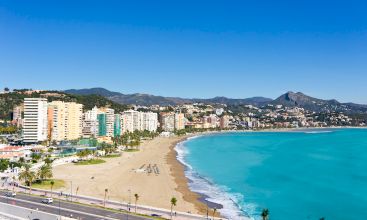
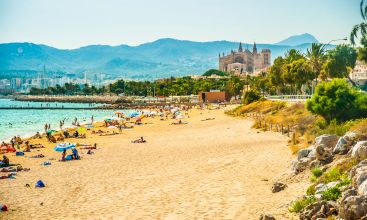
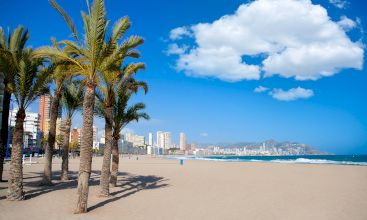
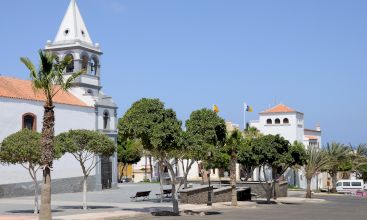
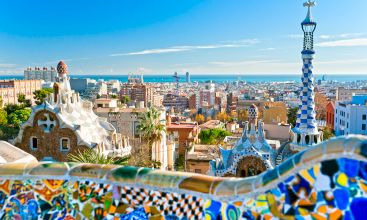
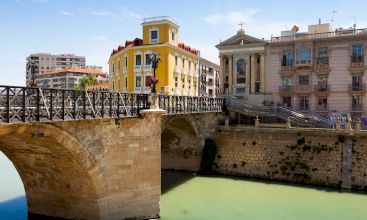
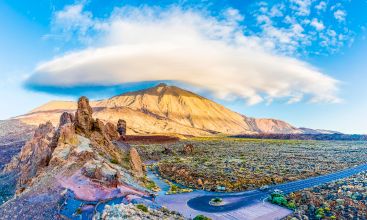
Popular rental locations in Spain
-
Car hire Malaga AirportFrom
£ 4 /day -
Car hire Mallorca AirportFrom
£ 9 /day -
Car hire Alicante AirportFrom
£ 3 /day -
Car hire Fuerteventura AirportFrom
£ 7 /day -
Car hire Barcelona AirportFrom
£ 5 /day -
Car hire South Tenerife Reina Sofia AirportFrom
£ 5 /day -
Car hire Ibiza AirportFrom
£ 7 /day -
Car hire Murcia-Corvera AirportFrom
£ 7 /day
Useful tips for a well-prepared trip
Which insurance should I choose, and what's the deal with the deposit? Read our articles with useful information and tips to ensure you choose the right rental car for you.
When to book a rental car in Spain
Car rental locations in Spain
EasyTerra Car Hire compares rental car prices at the following destinations
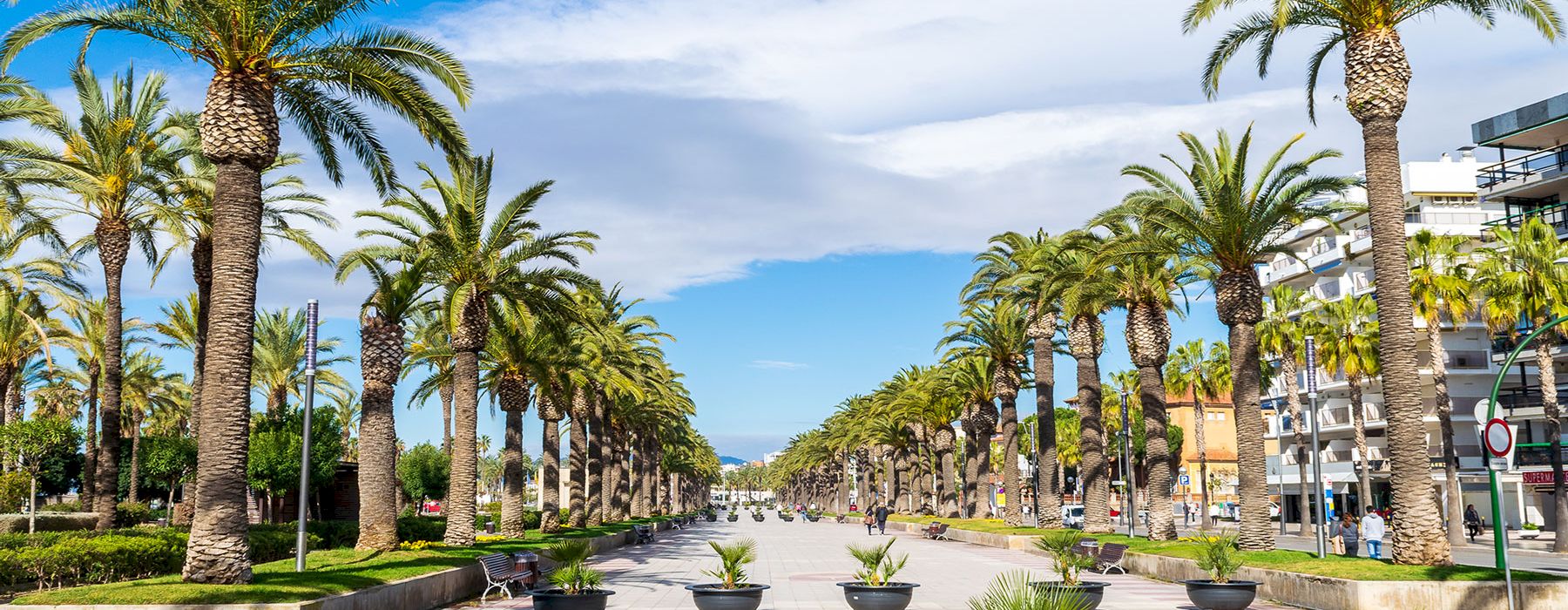
Location information for Spain
Spain is best explored by rental car. EasyTerra Car Hire has over 364 pick-up locations in Spain. This means there is always a pick-up location close to your destination.
Most popular car hire locations in Spain
Introduction
Spain is situated in the South-West of Europe, and it is a popular holiday destination for many tourists. You will find magnificent beaches and historical cities with remarkable architecture. The landscape is diverse and the temperatures pleasant. In part thanks to the increasing tourism, Spain has become one of the world's most important economies.
History
In prehistoric times, Spain was inhabited by various peoples. The Romans managed to conquer the entire Iberian Peninsula. They invaded the country in the second century BC and ruled until the fifth century AD. The Visigoths (a Germanic people) took over power, in turn to be beaten fairly soon by the Moors (Muslims from Africa). Roman influence is still the foundation of Spain's culture.
In the time of the Moors, there was a Moorish-Spanish culture with the city of Cordoba as its centre. The Islamic influence on Southern Spain is still present today. The Christians wanted to retake Spain and this was a prolonged process. In 1212, the Moors were defeated, but their culture continued to coexist with the Christian culture. It was not until 1492 that Spain was officially reunited, and Jews and Muslims were converted to Christianity or forced to leave. More than 120,000 left Spain.
Like Portugal, Spain undertook voyages of discovery. In 1492, Christopher Columbus, sailing under the Spanish flag, discovered the promised land of America. During the rule of the Habsburg in the 16th century, Spain became a world power. Charles V expanded his power over various countries. In the 17th century (the Spanish Golden Age), the kingdom ruled European countries (such as the Netherlands and Belgium), as well as countries in other parts of the globe, such as Argentina, Chile and the Philippines.
After the Golden Age, Spain started to decay. The country was plagued by inflation and had to fight numerous wars. Slowly it lost its colonies and international power. The downfall of the once mighty empire gave rise to much self-criticism. It was a difficult time of political instability, poverty and regional differences. Eventually, this led to the dictatorship of General Francisco Franco. Spain became a republic. Franco sympathized with Nazi Germany and fascist Italy. In spite of that, the general managed to maintain a quasi-neutral position during the Second World War.
In 1947, Franco restored democracy. A king was appointed. In 1955, Spain became a member of the United Nations. This ended years of isolation. In the 1960's the Spanish economy bloomed and the country gradually transformed itself in to a modern industrial nation with a flourishing tourist industry. In 1975, General Franco died, and Juan Carlos I became the new king of Spain. In 1978, he arranged for Spain to become a parliamentary democracy. In the 1980's, in addition to Catalonia and the Bask country, other regions also became autonomous. For the Bask liberation movement ETA this was not enough and there were several terrorist attacks.
In 1982, Spain became a member of NATO, and in 1986 it became a member of the European Community (EC). ETA's radical nationalism continued to cause problems. In 1998, a truce with ETA was announced. A year later, things were back to the way they had been before the truce was announced. International terrorism also caused a lot of panic. In 2004, Madrid was hit by various bomb attacks. Initially, ETA was blamed for this. However, it is most likely that al-Qaeda was behind the attacks, due to the fact that Spain had sent troops to Iraq. After the attacks the troops were withdrawn from Iraq.
Society and Culture
Spain has over 40 million inhabitants. The country is fairly sparsely populated and most people live in urban areas along the coast. Due to the occupation by many peoples the Spanish population is very heterogeneous. Their ancestors are, among others, Iberians, Romans, Visigoths, Berbers, Celts and Vandals. In the North-East of the country live the Catalans and in the North-West the Galician and Bask peoples. Also, there is a population group called the Gitanos, or gypsies. Since the 1980's, many immigrants have moved to Spain. Many of them came from South-America, Africa and Eastern Europe. The large influx of immigrants has contributed to the country's growing economy.
Spain's official language is Castilian, a language most people know as 'Spanish'. It is a Romanic language that has been influenced by Latin as well as other languages. Regional languages like Catalan, Galician, Bask and Aranean are also recognized as languages. These official regional languages are still spoken in large parts of the country. In addition to these languages, there is also a variety of dialects. In the tourist areas foreign residents, as well as the employees in the tourist branch and the tourists themselves, also speak German and English.
Roman-Catholicism is the dominant religion. More than 80% of all people are Roman-Catholic. This high percentage is in part due to general Franco, who used to force the people to convert to Christianity. Many people are officially Roman-Catholic, but they don't attend church on a regular basis. Nowadays, fewer and fewer Spaniards are attracted to the church. About four million no longer adheres to any religion, and in addition there are 800,000 Muslims. Although the Roman-Catholic church opposed same-sex marriage, a majority of the Spanish population voted in favor. This shows that the influence of the church is waning. The rural areas lag behind the urban areas. In rural areas, pilgrims still go on pilgrimages to holy places.
Spain's current culture descends from Roman times. However, the Spanish culture is not uniform. The various (and sometimes semi-autonomous) regions often have their own language and culture. More often than not, people feel equally connected to their regional culture as they do to the national culture. The Spanish are known as a friendly people. There are national festivals that are celebrated enthusiastically. Despite protests, bullfights continue to be held. The country also has many famous artists. The architect Antonio Gaudí became world famous. Most people have also heard of the painters Pablo Picasso and Salvador Dalí.
Political Situation
Spain has a constitutional monarchy. In 1975, Juan Carlos became King of Spain. The king is immune and has an influence on a number of important issues. The Spanish parliament consists of two chambers: the Congress of Representatives and the Senate. The Congress has 350 members who are elected every four years. From the age of 18, people are eligible to vote. The Senate has 259 seats, which are appointed by the provinces. The Congress elects the prime minister. José Luis Rodriguez Zapatero is Spain's current prime minister. His party, the Spanish Socialist Workers Party (PSOE), won the national elections in 2004.
In practice, Spain can be considered a federation of autonomous communities. Power is decentralized. The various communities or regions have, for example, a unique education and health system. Even the laws vary per region. Some regions want greater autonomy than they currently have. This above all applies to regions that are dominated politically by national parties. A good example is the Bask country.
Spain was the first country in the European Union (EU) that held a referendum about the European Constitution. Most of its inhabitants had a positive attitude toward the possible future European Constitution. However, the Constitution has not yet been approved. Many other EU countries rejected the Constitution.
Economy
In Spain, industrialization began late. For a long time, the country was predominantly agrarian. Since the 1950's, industry has developed. The services sector has also grown considerably. In particular tourism provides good revenues.
Due to the rapid economic growth, the structure of the professional population has changed. Whereas in the past 50% of the people worked in agriculture, that is now only a small percentage (7%). All over the country, grain is produced, but also wine and olive oil are important export products. Furthermore, the country exports citrus fruits, corn, flax, tobacco and cotton.
The most important industries are located in, among other places, Barcelona, Madrid, Valencia, Vizcaya and Zaragoza. Especially petroleum refinery and the production of chemical substances, transportation means and electrical equipment are important branches of Spain's industry. Germany, France, Netherlands, Great Britain, Italy and the United States are important trade partners.
Spain has grown to be one of the most important economies in Europe. The GDP per capita, life expectancy and the quality of life are very high. The country is a leading member of the European Union. In 1999, Spain was one of the first countries to adopt the euro as its currency. Prime Minister Aznar's time in office was a period of liberalization privatization and deregulation. This benefited the economy and unemployment fell. Current Prime Minister Rodriguez Zapatero wants to encourage innovation, research and developments. In addition, he wants to battle fraud and reduce government intervention.
Geography and Climate
Spain is located in the South-West of Europe and, together with Portugal makes up the Iberian Peninsula. The country's total surface is about 505,990 square kilometers. Madrid is the capital of the country. France, Portugal and Morocco (separated by the Straits of Gibraltar) are its neighbors. In all, Spain has a coastline of almost 5000 kilometers. The island groups, the Balearics, the Canary Islands and the Pityus islands also belong to Spain, as do Ceuta and Melilla (two Spanish enclaves in Morocco).
Spain's mainland is dominated by high plateaus and mountain ranges, like the Pyrenees and the Sierra Nevada. Numerous rivers originate in these mountain ranges. Examples of this are the Tagus (Tajo), the Ebro and the Duero. Madrid is the highest situated capital in Europe. The Mulhacén is the highest mountain top on Spanish mainland. This mountain is located in the Sierra Nevada and is 3,482 meters high. The only plains are located near the coastal areas, for example in Andalusia. These are called the Andalusian planes. The Mediterranean Sea, the Gulf of Biscay and the Atlantic Oceans all are Spain's shores.
Due to the irregular landscape the climate is not uniform. There are large climatic differences between the various areas of Spain. In the interior, there is a land climate. The winters here are cold and the summers are hot. During the summer, temperatures can rise to a staggering 40 degrees Centigrade. In the east of Spain, on the coast, the climate is Mediterranean. The summers are hot and dry and the winters are mild. Not much rain falls here. The northern coast has a moderate maritime climate. The summers are cool and the winters are mild. There is relatively much rain and as a result the landscape in this region is green. The summers here are not very warm and the winters are cold. The Canary Islands have a subtropical climate. There, the sun shines all year round. In the summer, the average temperature is 27 degrees Centigrade, and in the rest of the year the average temperature is about 22 degrees Centigrade. This makes these islands a popular holiday destination for many tourists.
Traffic and Infrastructure
Spain has over 100 airports. There are no fewer than 33 airports that also provide international flights. Important airports are Bajaras in Madrid and the Airport of Barcelona. It is a state company and provides both national and international flights. Other important international airports in Spain are, among others, Alicante Airport, Gerona Airport, Malaga Airport, Seville Airport, Valencia Airport.
The Spanish railway network is regulated by the state company REBFE. The total network covers around 1300 kilometers of tracks. Compared to the rest of Europe, train tickets are cheap. There are railway connections between virtually all cities in Spain. On average, these trains travel 200 kilometers per hour, which means that you will reach your destination quickly. In various cities, you can also travel by metro.
There are many bus companies in Spain, both public and private ones. The quality of the service is often high. Between the cities the connections are good, but in rural areas there are fewer buses. On Sundays, there are also fewer buses. Travelling by bus is often cheap and reasonably comfortable.
Many Spanish highways have toll booths. The Spanish road network covers around 317,000 kilometers, 2,000 of which have been added recently. The main highway runs from France all the way to Alicante. People drive on the right side of the road.
Barcelona, Valencia, Palma de Mallorca, Malaga, Cadiz, Las Palmas and Tenerife are the main ports of Spain. Transmediterranea is the most important ferry company. Ferries go to, among other places, the Balearic Islands, North-Africa and the Canary Islands.
Time zone
Spain has a time zone of GMT +1 (CET). The Canary Islands and Portugal are on GMT. During the summer, the clock is put ahead one hour.
Food and Drink
Not only the landscape and climate are very divers. The Spanish kitchen also offers great variety and is influenced by various cultures. Every region has its own specialties. Products that are used throughout the country are wine, cheese, legumes, rice and vegetables. Paella is a famous dish with rice and seafood. Spanish tortillas (potato omelet) and Gazpachio (cold tomato soup) are also eaten everywhere. Tapas are Spanish delicacies. They are small snacks that are officially served to bridge the period between lunch and dinner. Abroad, tapas have also caught on, and in various countries there are tapas bars. Spanish dishes are often simple, but the quality is high and the food is fresh.
Spain is known for its delicious wines. A typical Spanish wine is, for instance, Sangria (fruit wine). Also, the Rioja is served everywhere. Many Spaniards drink cheap table wine with their meals. Other well-known Spanish drinks are Horchata (a milk drink) and Clara (beer mixed with a soft drink). Generally speaking, Spanish beer isn't very strong. Both Spanish and foreign beer is available.
In Spain, it is customary to eat two hot meals a day. Lunch is around 3 pm and dinner as late as 9 pm. You may want to keep this in mind when you are looking for a restaurant. Tips are usually included in the bill. It is, however, customary to leave a small tip on the table.
Accommodations
Due to the many tourists, there will be enough hotels to your liking. The quality of the hotels is reasonable and you will often receive a warm welcome. Campers have a choice from very simple to very luxurious. Youth hostels offer a relatively cheap way to spend the night. There aren't many youth hostels in Spain, but there are enough in the major cities. Also, you can rent commercially or privately owned holiday cottages. A uniquely Spanish form of accommodation is a 'parador'. This accommodation is owned by the state and it allows you to get acquainted with the traditional Spanish culture. 'Paradores' are often located in beautiful surroundings and can be located in historical as well as modern buildings.
External Sources
For more information about Spain, we recommend Google and the following external sources:
Practical information
-
CurrencyEuro
-
Driving directionRight
-
City speed limit50 km/h
-
Freeway speed limit90 km/h
-
LanguageSpanish
-
Popular car categoryEconomy
What most people want to know
The following questions and answers are a selection of the most popular questions. If you do not find the answer to your question, have a look at the Frequently Asked Questions page or contact us.
- Ownerscar
- CarGest
- Autos Menorca
- Hiper Rent a Car
- Enterprise
- Gobycar
- Goldcar Key'n Go
- Hertz
- Avis
- TopCar
- Sixt
- KeyGo Rent
- Leasys
- Dollar Rent a Car
- Budget
- Centauro
- Flizzr
- Thrifty
- Nizacars
- Orlando Rent a Car
- Alamo
- Turisprime
- Drivalia
- Wiber Rent a Car
- Rentbycar
- National Car Rental
- Sicily by Car
- FireFly Car Rental
- RentalPlus
- Green Motion
- Europcar
- Keddy By Europcar
- Everycar
- Clickrent
- Record Go
- Goldcar
- OK Mobility
- wheego
- EECar Rental
- Rhodium Car Rental
- Abbycar
- InterRent
- DelPaso
- SurPrice car rentals
- Rentalk50
- K10 Rentacar
- Canarias Rent a car
- Autos Aguirre
- Exclusive GO
- Rent a star
- NÜ Car Rentals
- Carwiz rent a car
- McRent
- Touring Cars
- offUgo
- Payless Car Rental
- CITROEN
- Street Rent a Car
- ACE Rent A Car
- 2Rent
- Routes